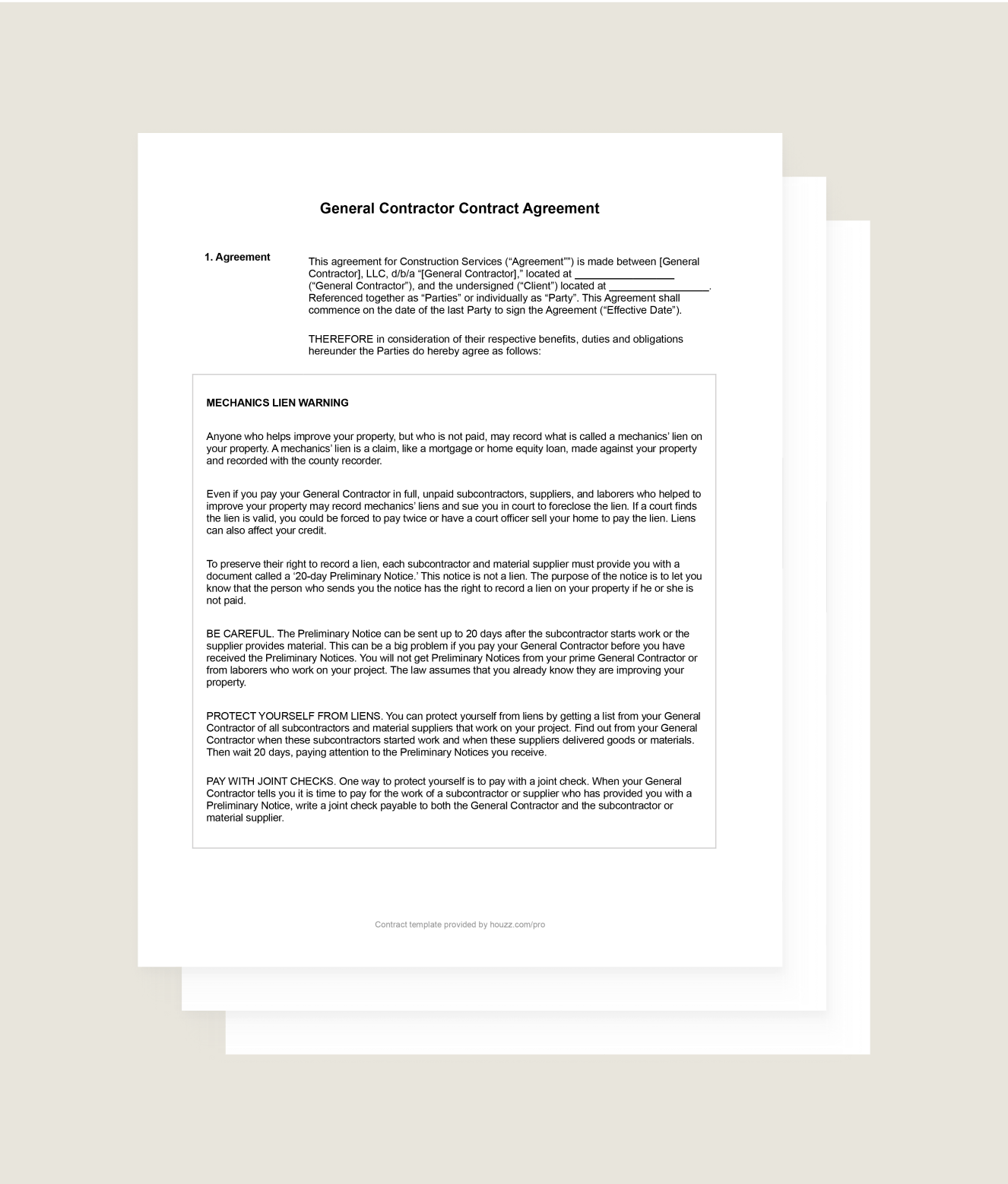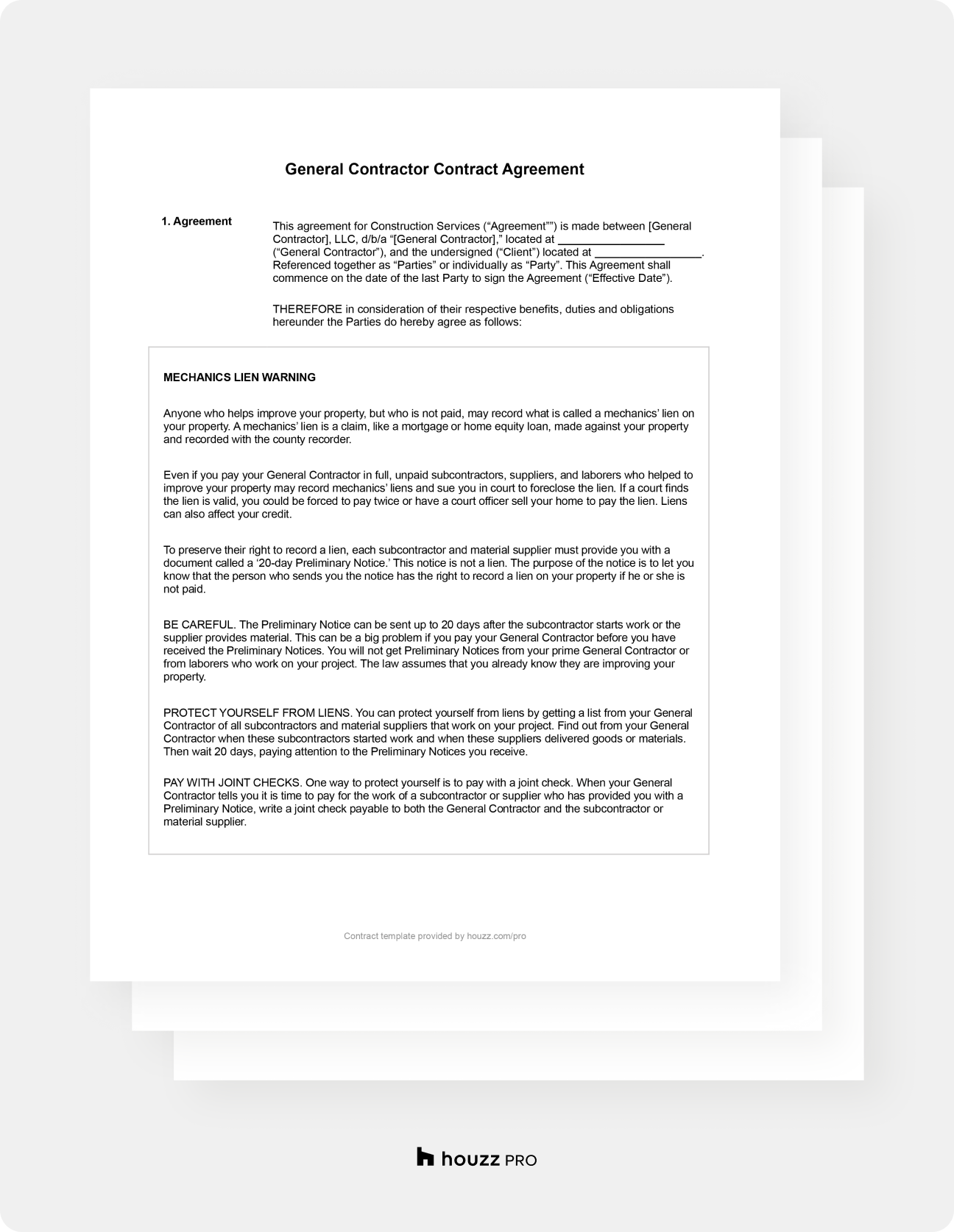Free Template: How to Write a General Contractor’s Contract
Protect the business you've worked hard to build. Download our free general contractor's sample contract & free template available in PDF or Word.

A general contractor’s contract form is a key way to protect both you and your clients for every project. In this article, we will show you everything you need to know about drafting and delivering a professional contract to your customers.
We explain the importance of contracts, what information to include in the document, and provide tips for making the task as easy and efficient as possible so you have more time to focus on the projects in your pipeline and attracting new ones. Included is a free, downloadable and editable general contractor’s contract template to make it easy to get started.
Click on a link below to jump to the section you’re most interested in:
- Download our free general contractor contract template
- What is a general contractor’s agreement contract?
- Why are general contractor contracts important?
- When do you need a general contractor contract?
- Types of general contractor’s agreement contracts
- 19 Clauses to include in a general contractor contract template
- How to create a general contractor’s contract step-by-step
- Tips for after you’ve drafted your general contractor contract
Download our Free General Contractor’s Contract Template

Here's a General Contractor's Contract Template on Us!
Customize this General Contractor's Contract Template to protect your business.
Most likely you did not get into the general contracting business, to spend your days shuffling paperwork. But whether you are new to the business, or an experienced contractor, you should know how to draft and deliver a professional contract before any work begins on a construction project.
Download our free general contractor contract template available in Word and PDF to get started on writing a contract. The template is fully editable so you can customize it to fit your specific business needs and use it for any type of project. It also includes a general contractor’s contract sample to serve as inspiration.

Luckily, besides templates, there are other tools available to make running your business easier, including the paperwork. General contractor business software helps you execute contracts more efficiently, and when it comes time for your client to approve them, let’s you offer them the conveniences of an e-signature. With business software, you can forget about storing your documents in bulky binders and file cabinets. All documents are kept safely in the cloud so they are organized, and easy to access when you need them.
Explore our e-signature and single central business hub features for free today with a free trial of Houzz Pro.

What is a general contractor’s agreement contract?
A general contractor’s contract form is a document that details every aspect of the contracting project, including the cost, scope of work, terms and conditions and more. It is the go-to document you can refer to should questions or disputes arise during the life of the project. Sometimes referred to as a general contractor agreement, a general contractor’s contract is legally binding once it is signed by all parties.
A contract differs from a change order or a scope of work document because it covers every aspect of the construction, alterations or renovations you are doing for a homeowner as well as the terms and conditions, timeline, responsible parties and more. As a general contractor you are likely to write up other contracts such as those between you and your subcontractors. This article covers the contract you negotiate with your clients.

Why are general contractor contract forms important?
Putting the time and effort it requires to create a comprehensive general contractor’s contract at the start of a project can save you headaches and money over the long term. A detailed contract signed off by all parties can help avoid costly change orders, or worse yet, legal bills.
A contract provides both you and your client both protection and peace of mind. The contract lays out exactly what happens in various situations such as last minute changes, or cancellations, and also ensures everyone is on the same page about the scope of the project and the services and products your company will provide. It puts everyone on the same page regarding the parameters of the project, resolves questions about when payments are due, and makes it clear who is responsible for what.

When do you need a general contractor’s contract template?
Having a general contractor’s contract form for every project no matter how big or small is good practice and can support you if a disagreement arises about the cost, scope and timeline of the project. A contract should be drawn up, finalized and signed by all parties before any work begins.

Types of General Contractor Contracts
There are various types of general contractor’s agreement contracts. These are four of the most common ones the most contractors use, depending on their preferences and type of projects:
- Fixed Price Under this scenario, the entire cost of the project is summed up in one lump sum. The client is responsible for paying that amount, but there also may be incentives built into the contract for finishing the project early, or penalties for going past the completion date.
- Cost Plus This method bills the client for the actual cost of the project including labor and materials. It also adds on a percentage or fixed fee to cover your overhead expenses and profit.
- Unit Pricing When the project is divided into unit measurements it is called unit pricing. The typical breakdown of the units include tasks covering the scope of work and the materials needed to carry out that work.
- Time & Materials For this type of billing, clients agree to pay a set hourly or daily rate for the project. They may also pay additional costs outlined in the contract such as markup and overhead.

19 Clauses to Include in a General Contractor’s Contract Template
The sections you include in your general contractor’s contract form will vary depending on the nature of the project and the specific needs of your business. To get you started, we have compiled a list of the most common ones included in every contract. You should always consult with a lawyer before delivering a contract to your client to make sure you have every aspect covered.
- Company & Client Information Include the information about your company and brand it with your logo. Also, list the name of the client, and contact information. In all cases, make sure you are using the full, legal names.
- Project Property Provide the exact address and location of the property where you will be doing the construction work. Refer to the legal deed location of the property whenever possible to provide clarity, especially for big projects or construction on a vacant lot.
- Services Detail what type of services your company is providing for the project so that there are no questions down the line.
- Mechanics Lien Most states require that the property owner be notified in advance if you are using a lien to help guarantee payment. Make note of it in the contract.
- Scope of Work Do not skimp on the details when you are outlining the parameters of the construction work you will perform for the project. It’s not unusual for client’s to change their minds throughout the life of a project, and this section provides clarity of the work they are agreeing to.
- Materials & Expenses This covers all the materials and costs associated with carrying out the project.
- Payment Terms Include a section that spells out the payment schedule and penalties for late payments or discounts for early ones.
- Construction Schedule This spells out the timeline of the project including a target start and finish date as well as the dates for various phases of the work.
- Permits & Licenses Don’t forget to list all permits that are required, the costs and who is responsible for acquiring them.
- Insurance & Security Not only is it legally required, but liability insurance protects you and provides clients peace of mind. Note your coverage parameters.
- Conditions & Responsibilities This section covers what conditions need to be met before work begins, as well as final inspections at the end of a project. It also outlines who is responsible for the tasks that make up the project work.
- Refunds, Cancellations, Termination Spell out the terms of when a refund would be issued or the contract canceled.
- Amendments Note how you will handle changes to the contract if a client changes their mind, or circumstances change on your end.
- Governing Law For a contract to be legal, you must list the state or governing law that interprets the document.
- Dispute Resolution Explain what steps will be taken to handle disagreements such as mediation, arbitration, and legal action.
- Warranties List the guarantees you provide for your construction work, and materials, what it covers and for how long.
- Indemnity General contractor contracts typically require contractors to compensate (indemnify) the client for any injury or losses associated with the work or resulting from a breach in the contract. Third parties, such as other subcontractors hired by the client, may also need to be included.
- Force Majeure Thankfully, you are not responsible for everything that can go wrong. This states that you are not liable for damage caused by circumstances beyond your control such as natural disasters.
- Signature Terms End the contract with a section to sign and date the contract. Make it clear what is being agreed to with the signing.

How to Create a General Contractor’s Contract Step-by-Step
Now that you know what to include in the contract, you can get started gathering all the information you need to write it up. Here’s the steps to get you there:
- Create a Budget The contract should include the exact and final cost of the construction or renovation project so be sure you have calculated all the expenses associated with the work, and have a quote or estimate prepared.
- Set a Schedule Determine the start and end dates of the construction project and the timeline for various phases of the work. Add target dates for each milestone. Anticipate possible delays caused by weather.
- Establish Terms of Subcontracting Review the type of subcontractors and tradespeople you will need to carry out the work and confirm the terms and costs.
- Define Provisions of Equipment & Materials Another key part of the project is determining the pricing and sourcing of the equipment and materials that will be used in the construction project. Confirm the availability of both to meet your schedule.
- Finalize the Scope of the Work Ensuring that you completely understand the expectations of the client and scope of the work avoids issues down the road. This may require checking back with the client to clarify and confirm their vision for the project and the services and materials you will provide.
- Determine Payment Schedule Set the terms and stages of payment before writing up the contract. Seeking a deposit before any work begins is good practice and assures the client is committed to your company and the construction work. Note when the payments are due and the penalties for late payments.
- Draft Contract Now that you have gathered every detail of the construction work you will provide, it’s time to draft your contract. Add the information into the contract under each heading.
- Consult With a Lawyer Before you send a contract to a client, protect your business by seeking the advice of a lawyer to ensure that you have adequately covered all the requirements.
- Review & Send Once you are happy and confident that the contract has covered all the bases, review it one more time and then send it to your client.

What’s Next? More Tips for Drafting Your General Contractor’s Contract Template
- Research State Requirements States have varying provisions and requirements regarding contracts for general contractors. Check the websites of the state or states in which you are conducting business.
- Include Your License Number List your license number on the contract. It is good practice to include this information on all your business documents such as estimates, invoices and your website. Besides the legal implications, licensing signals the professionalism of your business, and adds assurance for clients.
- IMPORTANT NOTE: Seek Counsel from a Professional Lawyer To make sure your contract is legally airtight, have a lawyer review any legal language in the contract or the contract in full. Paying an attorney up front to review your contract may end up saving you money in the long run in case of disputes.
- Don’t Forget the Signatures A contract is not valid unless it is signed and dated. Make it easy for clients to sign off by providing them with the ability to sign digitally, or online.
- Store Documents Safely Devise a secure place to store the contract and all your business documents so they can be referred to in the future and to protect the privacy of your clients and your business. Cloud-based storage that provides security and makes it easy to organize all your documents in a single place.

Conclusion
Contracts are an important way to protect your general contractor business and help projects run more smoothly. General contractor’s agreement contracts help keep everyone on the same page, provide a legal document to help resolve disputes, and can save you the cost and burden of multiple change orders and legal challenges.
Using a template is a great way to learn to write contracts, but there are even more intuitive tools available that make drafting a contract easier and more efficient. Sign up for a free trial of Houzz Pro General Contractor Software to explore our client communication, lead nurturing and file sharing features - all of which can help you keep client documentation organized.
Learn more about growing your general contractor business and How to Write a General Contractor Estimate with a free template.
The information contained in this article should not be relied upon as legal, business or tax advice. We encourage you to seek guidance from your legal counsel, business adviser or tax specialist regarding how this sample general contractor’s contract might or might not apply specifically to your business.

Want advice delivered to your inbox?
Unlock industry insights and updates for contractors and design pros
By signing up, I agree to the Houzz Terms of Use and Privacy Policy and that Houzz may use my information to contact me about relevant content, products, and services.












Join the conversation by commenting or asking a question below. The Houzz team reads every single comment, and we’ll get back to you by email if you need us!